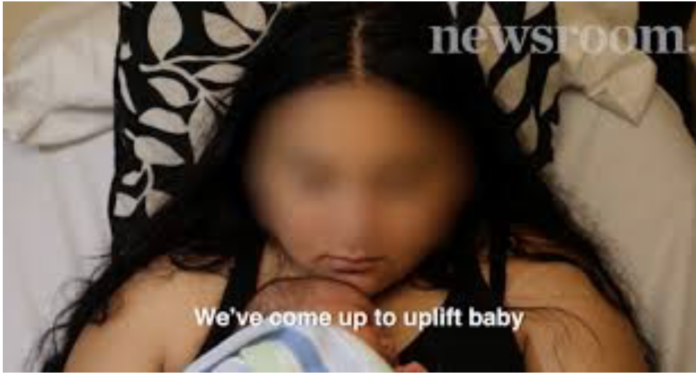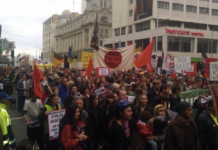Oranga Tamariki review: ‘Treatment of Māori women has been inhumane’ – Dame Naida Glavish
The Māori-led investigation, which started six months ago, is one of five into the ministry and was spearheaded by the Whānau Ora Commissioning agency.
Official figures released by the Children’s Commissioner in January showed Māori babies were five times more likely to end up in state care than non-Māori last year and their rate of urgent entries into state care has doubled since 2010.
The inquiry was based on contacts with more than 1000 whānau, both Māori and non-Māori on their experiences of the ministry.
In once incident, the report said, a mother said 14 armed police officers were used to remove a five-month-old Māori baby.
The mother said police and Oranga Tamariki staff converged on her home to carry out an uplift order that had been approved by the Family Court without the whānau receiving any notification.
The mother thought she was heading to a family group conference at Oranga Tamariki, but instead was met at her door by heavily-armed police with police dogs.
14 armed police officers were used to remove a five-month-old Māori baby?!?
The lesson from Oranga Tamariki is that you can wave dead brown babies into the face of NZ demanding ‘something must be done’ and we will justify any obscenity as a response, especially if that response is cost cutting under the guise of ‘get tough’ policy.
Please remember – Oranga Tamariki is a right wing experiment which aims to save the State money by intervening early – it has NOTHING to do with the welfare of the child or the whanau, it cares only about the welfare of the State.
If you are angry about Oranga Tamariki now, wait until you find out about the role of a private company being paid for international adoptions.






Hello good people of New Zealand. Today we have another piece of anti-Māori propaganda produced by The Crown. So we can expect high quality mainstream media journalism that is not biased and very accurate.
I believe this is just the tip of the iceberg a bit more digging and we will see other government departments are just as culpable, for example corrections, justice and courts, parole, HNZ, MSD, ACC and they talk about Maori gangs damaging communities fuck these groups are like state sanctioned gangs and have been since there inception. I have had dealings with many of them and so has many of my whanau they are cunts and that is putting it mildly. No wonder we have gangs they are products of the state. And I don’t want to hear people saying, stop blaming, unless they have had first hand experience with this lot cause not only is it traumatising its demoralising, stigmatising and it fucken wears you down. No wonder many of our people don’t want to fight or stick up for themselves and many don’t have the means. Often they don’t have a voice and then we speak up, people are quick to start judging you. Then we have the do goodies who say, ‘I managed to do this despite this and I managed to do that’ Well good for you we aren’t all cut from the same cloth.
Michelle: “….I have had dealings with many of them and so has many of my whanau they are cunts and that is putting it mildly.”
If you are as graceless in your approach to them as you have been in the above comment, and also in many of your comments to some of us on this blog site, small wonder if you get back what you dish out.
However. This post is about OT, not about all government agencies. OT is a child protection agency: thus its remit is to prevent harm to the innocents. No part of that remit includes being kind to you; or even polite, though I daresay the staff manage that at least.
It is possible to be both polite and respectful, and persistent in pursuit of answers. I know: I’ve done it. And it’s a great deal more effective than arrogance and bad language.
Not that I’m into harping and pushing shit uphill, but once again – generally!!! – it comes down to a need for reform of our public service agencies. (And by that, I mean at a managerial level – not the little peons at the coal face, most of whom are happy with a few treats and trinkets, a mana-inspiring job title, and promises of a brighter future)
There are two ways of fixing things. One is to actually acknowledge there is a problem and fix it. The other is to wait until it all goes pop, and pick up the pieces afterwards. We’re on track for the latter
“The Māori-led investigation, which started six months ago, is one of five into the ministry and was spearheaded by the Whānau Ora Commissioning agency.”
Yesterday, I listened to an interview about this investigation. It appears that the investigators cast their net very wide: many of the cases instanced in their report dated from well before the establishment of OT. There was evidently some revisionism – or possibly misunderstanding of what was happening. Or faulty recall. As an example, there’s this:
“In once incident, the report said, a mother said 14 armed police officers were used to remove a five-month-old Māori baby.”
Yesterday, I heard a witness to that incident challenge the accuracy of the above account. See this:
https://www.rnz.co.nz/national/programmes/checkpoint/audio/2018732553/oranga-tamariki-uplift-case-with-armed-police-disputed
“Official figures released by the Children’s Commissioner in January showed Māori babies were five times more likely to end up in state care than non-Māori last year and their rate of urgent entries into state care has doubled since 2010.”
This sad statistic reinforces what both Denis O’Reilly and Jean Te Huia have said about the meth epidemic over the past few years, and the resulting problems differentially affecting a part of Maori society. Te Huia has cautioned people against blaming OT: not its fault, she said, it’s just doing its job. The fault lies with the families, she said.
What lessons can we learn from this report? Firstly, that the social problems necessitating the uplift of babies for their safety are much more widespread in Maori society than probably most people had realised.
Secondly, claims that OT uplifts babies to save money fail to recognise the fact that those uplifts save the babies concerned from possibly irreparable harm, even death. A worthwhile saving, I’d have thought.
Thirdly, that care within the extended family may well be as dangerous for those unfortunate babies as care by their birth families. And nobody should be surprised at that: poor parenting practices in the birth family are very likely also to be present in the wider family.
“If you are angry about Oranga Tamariki now, wait until you find out about the role of a private company being paid for international adoptions.”
Say what? What is this about and – if there’s any substance to this claim – what has it to do with OT?
Comments are closed.